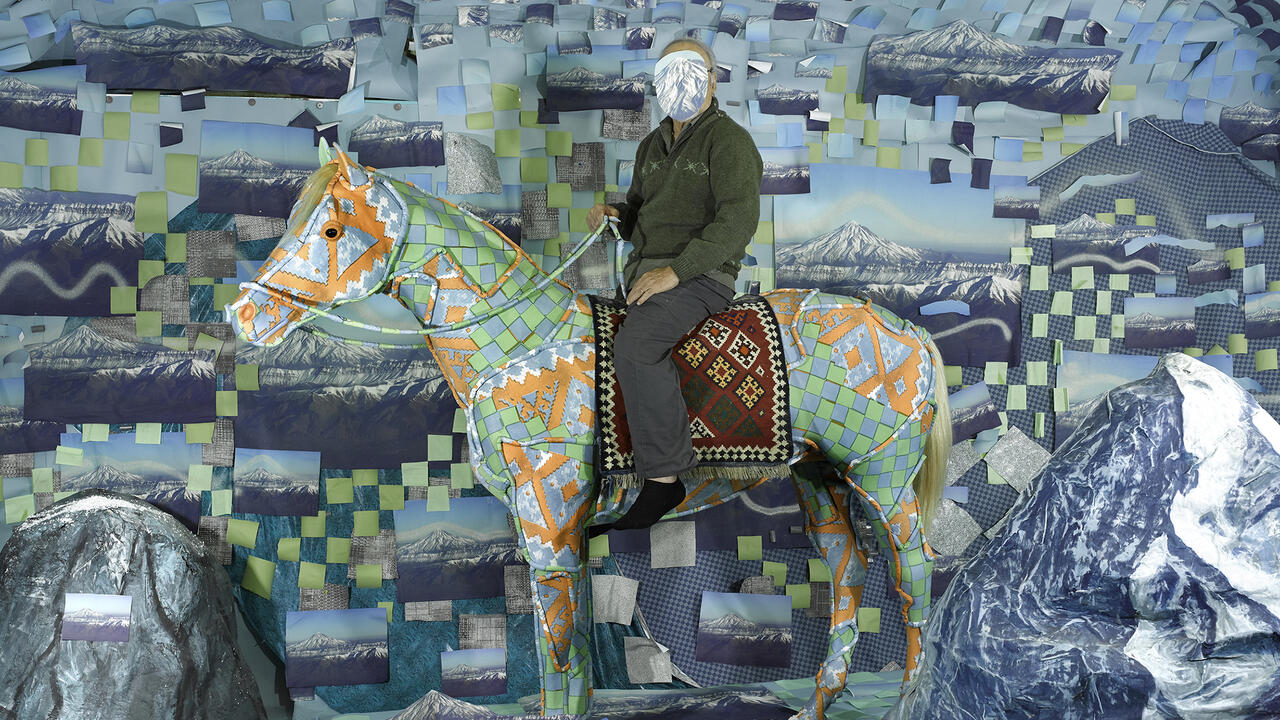Ndayé Kouagou Makes the Case for Influencer Wisdoms
In seeking freedom from a single identity, the artist stumbles across the truth within the paradox of online self-help speak
In seeking freedom from a single identity, the artist stumbles across the truth within the paradox of online self-help speak

At Ndayé Kouagou’s first institutional solo in Germany, a provocation, emblazoned in giant black letters on an aluminium billboard (Young again, 2023), stopped me in my tracks: ‘Please don’t be so young, and if you’re young don’t be yourself.’ The puzzling statement – one of many frank and, at times, facetious remarks that have come to typify the artist’s text-based works – prompted me to enter one of those moments of existential quandary that occur in my life regularly.

Kouagou’s show at Westfälischer Kunstverein, ‘Sorry, but your beloved mom is not always right!’ (2024), may seem like an affront to every visitor’s mother but might, in fact, be targeted at the artist’s own. Kouagou told me, when we spoke this summer, that according to his mother: ‘You can’t do everything you want to do in life.’ While her advice came from a place of parental love and caution, this attempt to shield her son from failure by steering him towards more pragmatic professional pursuits was viewed as a yoke by the multidisciplinary creative. Before practicing contemporary art, Kouagou was a motion designer, mainly for the fashion industry, but the charismatic and protean artist has also delved into the fields of DJing and ambient-music production. ‘I’m looking for freedom,’ Kouagou explained to me. ‘I create conversations and then I bring [these] dialogues into different mediums and formats, such as performance, video and installation.’

Curious, I asked whether he enjoyed his upbringing in Paris. With a sly grin and a full chest, he retorted confidently, ‘No,’ going on to explain that racism was at the heart of the problem. ‘When I was growing up in the 1990s,’ he said, ‘many people, including some people of colour, were not fully aware of the racism, so we accepted it way too much. It was a form of silent violence.’ His work, however, is anything but taciturn, nor does it internalize the survival techniques learned in his childhood. Instead, his one-man videos rebel against the essentializing of personhood that he experienced as a young Parisian, with the artist adopting multiple on-screen alter egos that are, at times, camp or wry.
‘Sorry, but your beloved mom is not always right!’ builds on his monumental video installation and first museum solo, ‘Guru’, which debuted at Fondation Louis Vuitton last year. Kouagou satirized social-media influencers by asking the viewer to turn inwards and deepen their sense of self in a way that draws parallels to the empty life advice often distributed by internet personalities.

Kouagou is a performer and his starting point is play. This is partially because he doesn’t want his audience to feel attacked. Rather, he would like them to submit to the dream worlds created by his video installations. In A coin is a coin (2022), Kouagou sits in a photo studio wearing a cropped yellow shirt and an overlong tailcoat – the type of attire that exudes confidence and demands attention. The framing is direct, like that of a YouTuber speaking to their followers. It's a device the artist replicates in the three-channel video A change of Perspective (2023).
Kouagou’s installations aren’t a passive experience: rather, they actively engage visitors, guiding them between the Kunstverein’s three rooms. Kouagou’s characters provide viewers with physical gestures that prompt them to move from one video to the next, though the connecting plot is desultory. Each protagonist dispenses hollow aphorisms or enigmatic words of counsel straight to camera which, when reflected on, make little sense. This confusion is expounded by the quotes taken from the videos and displayed in bold text on brushed metal sheets or, in smaller font, suspended in transparent acrylic boxes around the gallery. Lines such as ‘It’s time to shine’ (Shine & Shine, 2023) or ‘And is there anything to look for except answers’ (The Real Question, 2023) encircle the visitor.

I asked Kouagou why he chooses to present his work in English. The answer stems from his early journal writing practice, which included some poetry. Simply put: when he wrote about love in French, he felt that the words were ‘corny’, so English became his language of expression. It also serves to distance his video avatars from his socialized identity as a French, Black male. To further this sense of disassociation, all the monologues he records are dubbed by Zimbabwean actor Salber Lee Williams.
Despite these disorientation tactics and the baseless self-help logic Kouagou’s aliases espouse, the artist’s body of work still offers a unique perspective that I hoped would cleanse me of angst and explain how to finally achieve self-actualization. The answer, it turns out, may not be in the words hammered onto the gallery walls but in the keen attention the artist pays to their presentation: The ‘freedom’ Kouagou and myself are in search of might be contingent on how successfully we perform self-confidence.
Ndayé Kouagou’s ‘Sorry, but your beloved mom is not always right!’ is on view at Westfälischer Kunstverein until 15 September






















